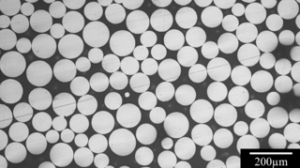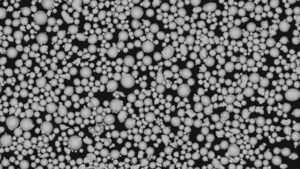Polvo de FeCoNiCruna aleación de alta entropía (HEA), está ganando importancia en la fabricación avanzada, la ciencia de los materiales y las aplicaciones industriales debido a sus excepcionales propiedades. Conocida por su versatilidad y robusto rendimiento, esta aleación metálica en polvo está compuesta por hierro (Fe), cobalto (Co), níquel (Ni) y cromo (Cr). Tanto si es ingeniero, investigador o fabricante, conocer el polvo FeCoNiCr puede transformar sus procesos y aplicaciones.
En este artículo, profundizaremos en la composición, características, aplicaciones, ventajas y limitaciones del polvo de FeCoNiCr. También compararemos diferentes modelos y grados, analizaremos las opciones de los proveedores y responderemos a algunas preguntas frecuentes.
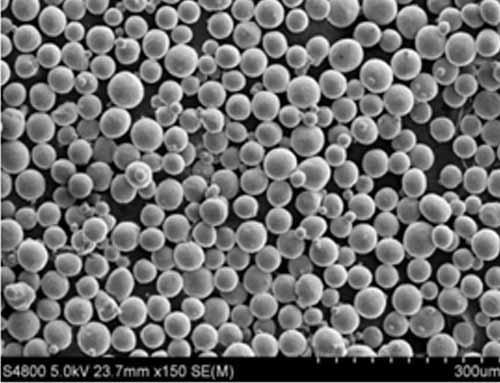
Descripción general del polvo de FeCoNiCr
El polvo FeCoNiCr pertenece a la familia de las aleaciones de alta entropía, que son sistemas multielementos con proporciones casi iguales. Esta composición única da como resultado una resistencia excepcional, resistencia a la corrosión, estabilidad térmica y resistencia a la fatiga, cualidades muy deseables en aplicaciones críticas de ingeniería.
Resumen de datos clave
| Propiedad | Detalle |
|---|---|
| Elementos | Hierro (Fe), Cobalto (Co), Níquel (Ni), Cromo (Cr) |
| Categoría | Aleación de alta entropía (HEA) |
| Aplicaciones | Aeroespacial, Automoción, Biomédica, Herramientas, Almacenamiento de energía |
| Puntos fuertes | Excelentes propiedades mecánicas, estabilidad térmica y resistencia a la corrosión |
| Métodos de producción | Pulvimetalurgia, fabricación aditiva y pulverización térmica |
Composición del polvo FeCoNiCr
La composición del polvo de FeCoNiCr implica proporciones casi equimolares de sus metales constituyentes. Sin embargo, variando ligeramente la composición se pueden obtener propiedades específicas del material. He aquí un desglose:
| Composición | Contenido elemental (wt%) | Papel |
|---|---|---|
| Hierro (Fe) | 20-25 | Proporciona resistencia básica y ductilidad |
| Cobalto (Co) | 20-25 | Mejora la resistencia magnética y al desgaste |
| Níquel (Ni) | 20-25 | Mejora la resistencia a la corrosión y la tenacidad |
| Cromo (Cr) | 20-25 | Añade resistencia a la oxidación y dureza |
Características de FeCoNiCr Polvo
¿Qué hace que el polvo de FeCoNiCr sea tan especial? A continuación se detallan sus características:
| Característica | Descripción |
|---|---|
| Estabilidad térmica | Conserva las propiedades mecánicas a altas temperaturas, ideal para aplicaciones aeroespaciales. |
| Resistencia a la corrosión | Resistencia superior a la oxidación, lo que la hace adecuada para entornos difíciles. |
| Alta dureza | Excelente resistencia al desgaste, que prolonga la vida útil de herramientas y componentes. |
| Propiedades magnéticas | Fuertes características magnéticas, especialmente en aplicaciones con contenido de cobalto y hierro. |
| Personalización | Las proporciones elementales pueden ajustarse para aplicaciones específicas. |



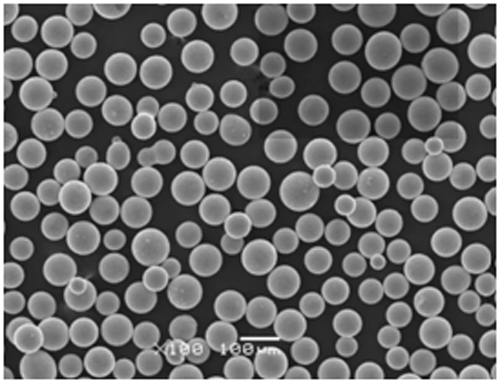

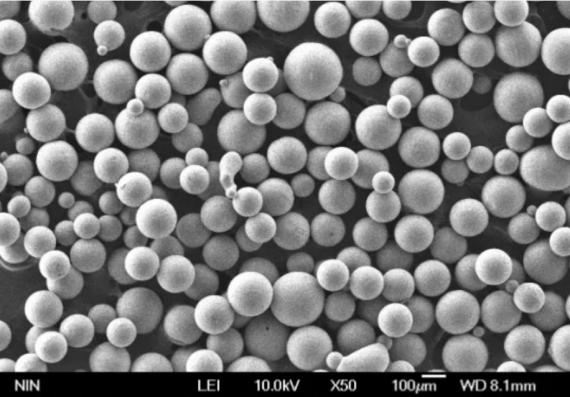
Ventajas del polvo de FeCoNiCr
¿Por qué elegir polvo de FeCoNiCr en lugar de otras aleaciones? He aquí lo que lo diferencia:
- Durabilidad excepcional: El FeCoNiCr supera a muchas aleaciones tradicionales en entornos de alta tensión.
- Versatilidad en las aplicaciones: De la industria aeroespacial a la biomédica, se adapta a diversos campos.
- Producción rentable: La pulvimetalurgia reduce los residuos y optimiza el uso del material.
- Ecológico: La mayor vida útil de los componentes se traduce en un menor consumo de material y energía.
Modelos y grados de polvo de FeCoNiCr
Existen varios modelos de polvo de FeCoNiCr para diferentes industrias y aplicaciones. A continuación se presentan diez modelos destacados:
| Modelo | Descripción |
|---|---|
| FeCoNiCr-Al | Estabilidad térmica mejorada para aplicaciones de alta temperatura. |
| FeCoNiCr-Mn | Mayor resistencia a la corrosión en entornos marinos. |
| FeCoNiCr-Ti | Adición de titanio para aplicaciones de mayor resistencia y ligereza. |
| FeCoNiCr-WC | Adición de carburo de wolframio para una resistencia extrema al desgaste en las herramientas. |
| FeCoNiCr-BN | Nitruro de boro mejorado para lubricación y resistencia al desgaste. |
| FeCoNiCr-Cu | Inclusión de cobre para mejorar la conductividad eléctrica. |
| FeCoNiCr-Nb | Adición de niobio para el endurecimiento por precipitación en componentes aeroespaciales. |
| FeCoNiCr-Zr | Contenido en circonio para una mayor resistencia a la oxidación. |
| FeCoNiCr-Si | Adición de silicio para mejorar la maquinabilidad y la resistencia a la oxidación. |
| FeCoNiCr-Ce | Elementos de tierras raras para mejorar las propiedades magnéticas y térmicas. |
Aplicaciones de FeCoNiCr Polvo
El polvo de FeCoNiCr se utiliza en múltiples industrias por su versatilidad y sus propiedades superiores:
| Industria | Solicitud | Beneficios específicos |
|---|---|---|
| Aeroespacial | Componentes de motores a reacción, álabes de turbina | Gran estabilidad térmica y resistencia a la fatiga. |
| Automotor | Piezas de motor, sistemas de escape | Resistencia a la corrosión y rendimiento a altas temperaturas. |
| Biomédica | Implantes, prótesis | Biocompatibilidad y resistencia al desgaste. |
| Herramientas | Herramientas de corte, moldes | Extrema dureza y resistencia al desgaste. |
| Energía | Electrodos de baterías, pilas de combustible | Alta conductividad eléctrica y estabilidad. |
Especificaciones, tamaños y calidades
| Parámetro | Detalle |
|---|---|
| Gama de tamaños de partículas | 10-150 µm |
| Niveles de pureza | >99% |
| Normas cumplidas | ASTM F75, ISO 5832-1 |
| Opciones de envasado | 1 kg, 5 kg, 25 kg |
| Grados disponibles | Composición estándar, ultrapura y personalizada |
Proveedores y precios
| Proveedor | Región | Precios (aprox.) | Características especiales |
|---|---|---|---|
| Tecnología Carpenter | EE.UU. | 100-120 $/kg | Ofrece fórmulas de aleación personalizadas. |
| Höganäs AB | Suecia | 90-110 $/kg | Líder en materiales pulvimetalúrgicos. |
| Materiales Sandvik | Global | 95-$125/kg | Cadena de suministro fiable y de gran pureza. |
| Especialidad AMETEK | EE.UU. | $105-$130/kg | Centrarse en las aleaciones de calidad aeroespacial. |
| VDM Metales | Alemania | 110-140 $/kg | Conocida por sus estándares de polvo de alta calidad. |

Pros y contras de FeCoNiCr Polvo
| Aspecto | Pros | Contras |
|---|---|---|
| Rendimiento | Excepcional resistencia térmica y a la corrosión | Mayor coste en comparación con las aleaciones convencionales. |
| Personalización | Composición elemental adaptada a las necesidades | Requiere técnicas de fabricación avanzadas. |
| Durabilidad | Larga vida útil en condiciones duras | Base de conocimientos limitada en comparación con las aleaciones tradicionales. |
preguntas frecuentes
| Pregunta | Respuesta |
|---|---|
| ¿Para qué se utiliza el polvo de FeCoNiCr? | Componentes aeroespaciales, implantes biomédicos, herramientas y almacenamiento de energía. |
| ¿Cómo se fabrica el polvo de FeCoNiCr? | Mediante pulvimetalurgia avanzada, fabricación aditiva o pulverización térmica. |
| ¿Se puede personalizar la composición? | Sí, la proporción elemental puede ajustarse para optimizar propiedades específicas. |
| ¿Cuáles son las principales ventajas del polvo de FeCoNiCr? | Alta resistencia, resistencia a la corrosión y excelente estabilidad térmica. |
| ¿Es ecológico el polvo de FeCoNiCr? | Sí, ofrece una mayor vida útil de los componentes y reduce el desperdicio de material. |
| ¿Qué industrias confían en el polvo de FeCoNiCr? | Sectores aeroespacial, automoción, biomédico, utillaje y energía. |
| ¿Existen alternativas al polvo de FeCoNiCr? | Sí, otras aleaciones de alta entropía o superaleaciones tradicionales como Inconel o Hastelloy. |
| ¿En qué se diferencia el FeCoNiCr del Inconel? | El FeCoNiCr ofrece una mejor personalización y una resistencia térmica y a la corrosión comparables. |
| ¿Cuál es el coste medio del polvo de FeCoNiCr? | Entre 90 y 140 dólares el kilogramo, según la pureza y el proveedor. |
| ¿Qué retos plantea el uso de polvo de FeCoNiCr? | Costes de producción más elevados y datos históricos limitados en comparación con las aleaciones tradicionales. |
